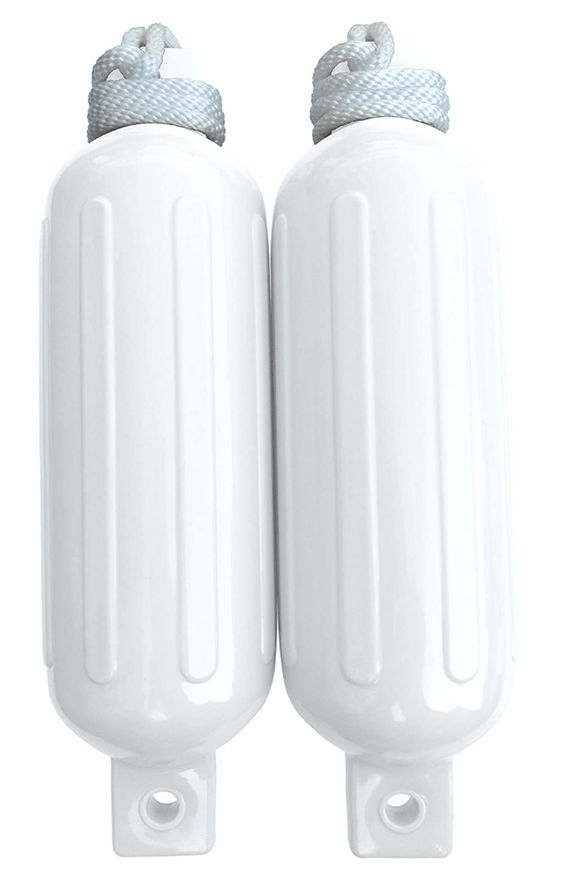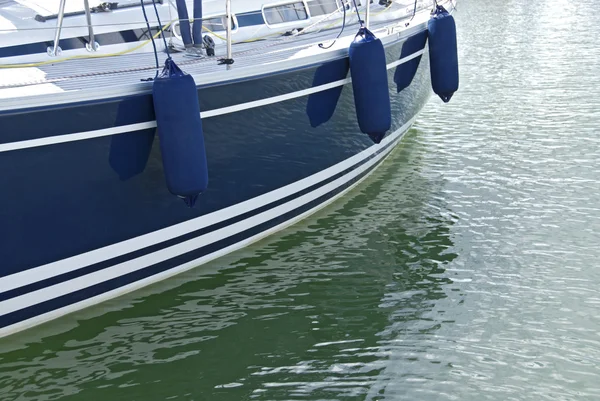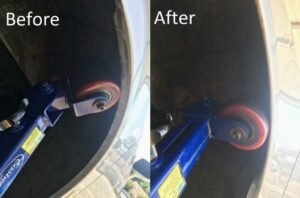How to Clean White Boat Fenders is probably a question every boat owner has faced at some point. Those bright, white fenders can quickly become dull and covered in stains after a few trips on the water. But don’t worry! Cleaning them is easier than you think, and I am here to show you how.
In this guide, I will break down some simple yet effective ways to clean your boat fenders. We Will go through easy methods that don’t require harsh scrubbing or special equipment. Plus, I will share some tips to keep them looking new and protect them from future stains.
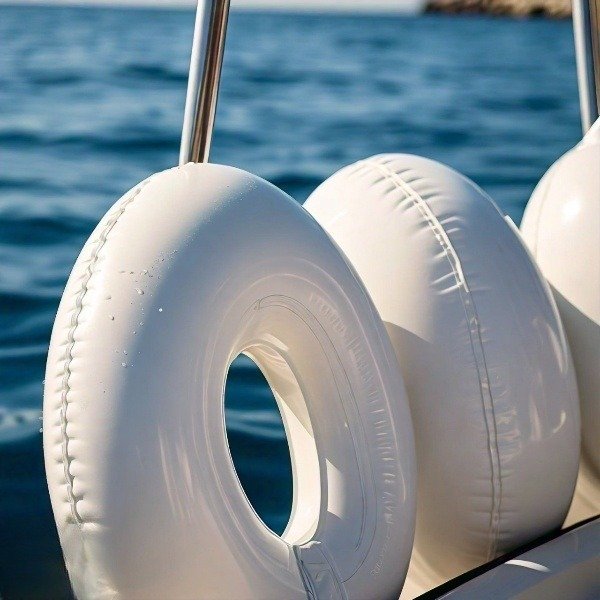
Caring About Your Boat Fenders Cleaning
Boat fenders are your boat’s first line of defense against bumps and scrapes when docking. Keeping them clean isn’t just about looks—it’s about maintaining their durability. Dirt, grime, and saltwater can weaken the fender’s material over time, causing them to degrade faster. By maintaining them, you not only keep your boat looking sharp but also extend the life of your fenders. Sounds good, right?
Cleaning Your White Boat Fenders is Essential
Alright, let’s dive into why cleaning your fenders regularly is so important. If you’re wondering, “Why bother?” This section is for you!
Protect Your Investment
Boat fenders aren’t cheap, and they play a critical role in protecting your boat. When you invest in high-quality fenders, you want them to last. Cleaning them regularly is one of the simplest ways to maintain their condition and appearance. Over time, dirt, scuff marks, and salt stains can accumulate, making them look old and worn. Keeping boat fenders white not only looks good but also protects the material, ensuring they remain effective in cushioning your boat against impacts.
Prevent Dirt Buildup
It’s easy to overlook those fenders dangling off the side of your boat, but they pick up all kinds of grime. Without regular cleaning, this dirt can build up, creating an even bigger job later on. Trust me, it’s much easier to clean your fenders often than to try to scrub off months’ worth of dirt and stains.
Fight Saltwater Stains
If you are out on the ocean, saltwater can be a real issue. It leaves behind tough stains and can even damage the fender’s material. When you clean boat fenders regularly, you are washing away these harmful residues. This prevents the fenders from becoming brittle and losing their protective quality.
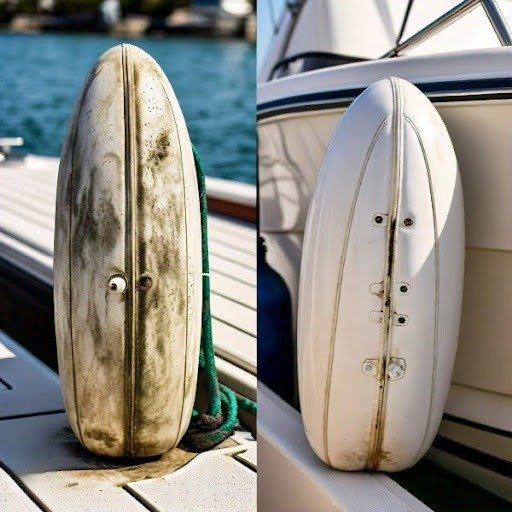
Maintain The New Look
We all love that feeling of stepping onto a freshly cleaned boat. Keeping your white boat fenders looking new is part of that whole experience. It shows that you care about your boat and its accessories. Plus, if you ever decide to sell your boat, pristine fenders are a small detail that potential buyers will notice.
Easy Maintenance
Cleaning boat fenders doesn’t have to be a chore if you keep up with regular maintenance. A quick rinse and wipe-down after each outing can save you a lot of time and effort in the long run. By following the simple methods we’ll go over later in this guide, you’ll be able to keep your fenders in top shape without much hassle.
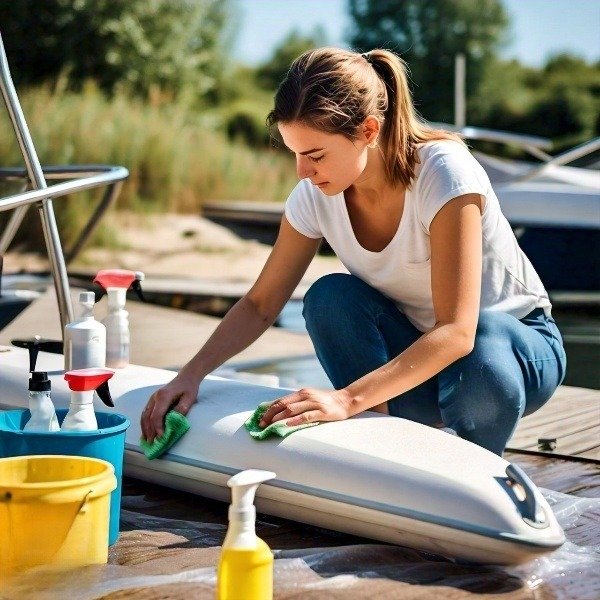
a sponge and cleaning supplies.
Eco Friendly Cleaning Matters
You might be tempted to grab some heavy-duty cleaner to get rid of those tough stains, but be careful! Using harsh chemicals can damage your boat fenders and harm marine life. That’s why we’ll discuss natural methods to clean boat fenders later in this guide. Eco-friendly cleaning products are not only better for the environment but also gentler on the fenders’ surface, helping them last longer.
Preparation Before Cleaning
Before we get into how to clean white boat fenders, it’s essential to gather everything you’ll need. Proper preparation makes the job much easier and ensures you get the best results.
Gather Your Cleaning Tools
Here’s a quick checklist of tools to have on hand before starting the cleaning process.
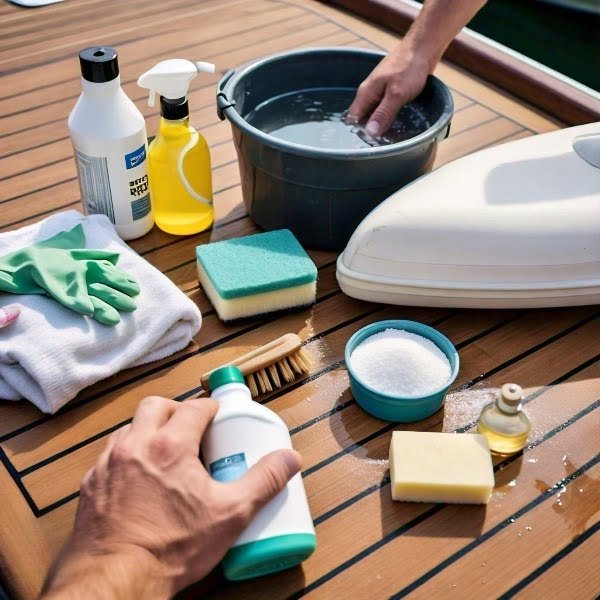
Soft brush- Helps scrub off dirt without scratching the fender.
Sponge- Useful for applying soap and wiping away grime.
Mild soap- Pick an eco-friendly soap or dish soap that is gentle on the vinyl surface.
Boat fender cleaner- Keep a specialized cleaner around for stubborn stains. Choose the one designed for vinyl to avoid damage.
Microfiber cloth- Ideal for drying the fenders without leaving streaks.
Bucket of clean water-Fresh water is crucial for rinsing off soap and dirt.
White vinegar and baking soda-For natural cleaning solutions and tackling tougher stains.
Marine fender polish- (Optional) To restore shine and add a protective layer after cleaning.
Protection First
Before you start, remember to use cleaners that are safe for both the environment and your fenders. Avoid harsh chemicals, as they can damage the vinyl surface and harm marine life. Always wear gloves when using any cleaner to protect your skin. It’s also a good idea to test any new cleaner on a small, hidden area of the fender before applying it to the whole surface.
Guide to Clean White Boat Fenders
Now that you have your tools ready, let’s dive into the best ways to clean your boat fenders. We’ll start with the basic cleaning method and then cover how to deal with tougher stains.
Basic Cleaning Method
This method is quick, easy, and perfect for routine maintenance. Here’s how to get started.
- Rinse the fenders
Use a hose or a bucket of fresh water to rinse off the surface dirt. This helps to loosen any grime before scrubbing. - Apply mild soap
Grab your sponge and apply a small amount of mild, eco-friendly soap. Gently scrub the entire surface in circular motions to lift dirt without scratching. - Scrub gently
If you encounter scuff marks or grime, use a soft brush to gently scrub the area. Avoid using hard-bristled brushes, as they can scratch the vinyl. - Rinse thoroughly
After scrubbing, rinse the fenders again to remove any soap residue. Make sure to wash away all the dirt and cleaner to avoid streaks. - Dry with a microfiber cloth
Pat the fenders dry using a microfiber cloth to prevent water spots and streaking.
This basic method works wonders for regular upkeep and keeps your white boat fenders looking fresh. It’s a simple, yet effective way to maintain them.
Removing Tough Stains and Marks
Sometimes, basic cleaning isn’t enough. Here’s how to tackle those stubborn stains and scuff marks.
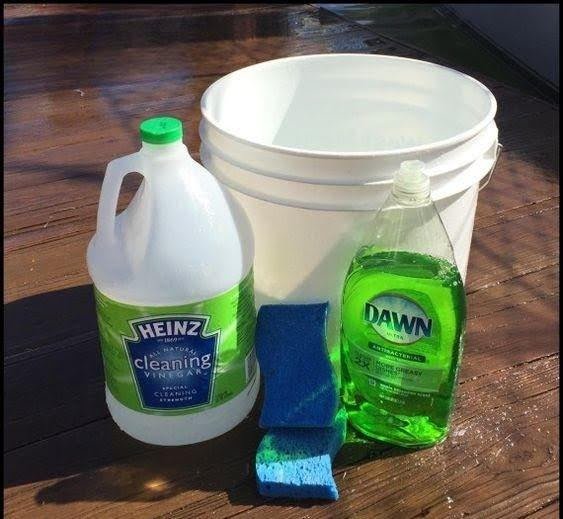
- Use a boat fender cleaner
For tough stains, use a specialized boat fender cleaner. Apply a small amount directly to the stain and let it sit for a minute. - Scrub with a soft brush
Gently scrub the area with a soft brush. This helps lift deep stains without damaging the fender’s surface. - DIY natural cleaner
If you prefer a natural approach, mix baking soda with a little water to create a paste. Apply this paste to the stain, scrub gently, and rinse with water. This method is great for eco-friendly fender washing. - Vinegar for scuff marks
For scuff marks, use white vinegar. Soak a cloth in vinegar and rub the mark in a circular motion. This should help remove the mark without using harsh chemicals.
Natural Methods For Deep Cleaning
If your fenders need a more thorough cleaning, natural methods work just as well. Here’s a quick, eco-friendly way to deep clean your boat fenders:
- Create a vinegar and baking soda paste
Mix equal parts white vinegar and baking soda to create a paste. - Apply the paste
Spread the paste over the stains and let it sit for about 10 minutes. This allows the natural cleaners to break down the grime. - Scrub gently
Use a sponge or soft brush to scrub the fender, focusing on stained areas. - Rinse off
Wash off the paste with clean water. Make sure to rinse thoroughly to avoid leaving any residue. - Dry
Pat dry with a microfiber cloth.
Natural methods like these are safe for your boat fenders and the environment. Plus, they are a great alternative to chemical cleaners.
Tips for Maintaining White Boat Fenders
How to clean white boat fenders is important, but keeping them clean is even better! Regular maintenance helps your fenders look new and last longer. Here are some simple tips to make that happen.
Regular Cleaning Schedule
Sticking to a regular cleaning schedule is key. Depending on how often you use your boat, aim to clean the fenders at least once a month. If your boat is in saltwater frequently, consider a quick rinse with fresh water after each outing. This will prevent salt stains from building up and make deep cleaning much easier. Routine maintenance saves you time and effort in the long run.
Preventing Future Stains
Prevention is always better than a tough scrubbing session. Here are a few tricks to keep dirt and stains at bay.
1-Apply marine fender polish
After cleaning your fenders, apply a marine fender polish or protectant. It creates a protective barrier that repels dirt, grime, and UV rays, keeping the fenders shiny and stain-free.
2-Use fender covers
Investing in fender covers is another great way to keep your white fenders clean. They take the brunt of the dirt and can be washed or replaced as needed.
3-Avoid direct sunlight
When storing your boat, try to keep the fenders out of direct sunlight. UV rays can cause them to discolor over time.
By incorporating these small steps into your regular care routine, you can keep your boat fenders looking new for longer.
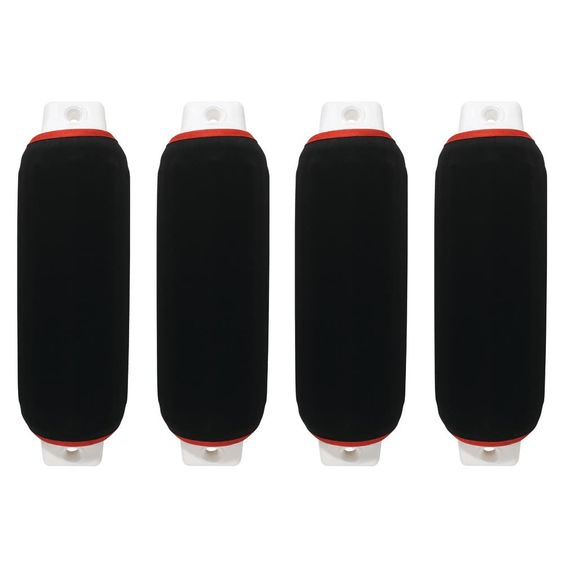
Best Cleaning Products for White Boat Fenders
Using the right cleaning products can make a big difference in how effectively you can maintain your boat fenders. Let’s go over some of the best products out there to help with how to clean white boat fenders.
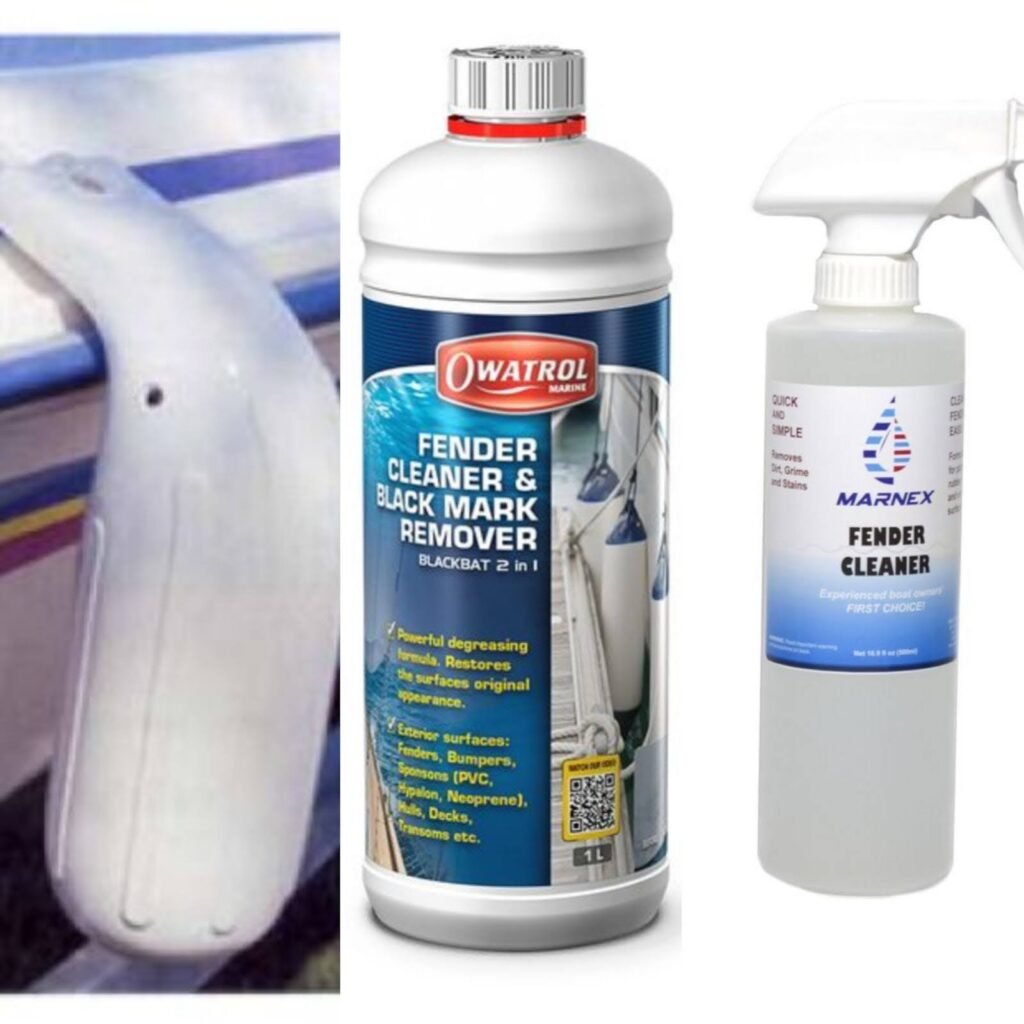
Specialized Boat Fender Cleaners
When dealing with stubborn stains, a specialized boat fender cleaner can be your best friend. Look for products specifically designed for marine vinyl surfaces. They are formulated to tackle dirt, salt, and scuff marks without damaging the fender material. Here are some popular options.
1-Marine Spray Cleaners-These come in convenient spray bottles and are easy to apply. They cut through grime quickly and are often eco-friendly.
2-Vinyl Protectant- Products like 303 Marine Vinyl Protectant not only clean but also add a UV-blocking layer to protect your fenders from sun damage.
3-Magic Erasers- For scuff marks, magic erasers work wonders. They gently scrub off marks without harsh chemicals.
Always read the product labels to ensure they are safe for your specific fender material. Also, rinse thoroughly after using any cleaner to prevent residue buildup.
DIY Natural Cleaners
If you prefer eco-friendly solutions, natural cleaners can also do the trick. A simple mixture of white vinegar and baking soda can handle most stains. Plus, it’s a budget-friendly option. Simply mix the two ingredients into a paste and apply it to the stained area. Scrub gently, rinse, and voila! A cleaner, brighter fender without any harmful chemicals.
Pro Hacks for Effortless Cleaning
Everyone loves a good hack, especially when it makes cleaning easier. Here are a few pro tips to keep your fenders spotless without breaking a sweat.
Use Baby Oil for Shine
Once your fenders are clean, use a small amount of baby oil on a cloth to buff them to a high shine. It not only makes the fenders look great but also creates a slight barrier that repels dirt. Just be careful not to overdo it – a little oil goes a long way!
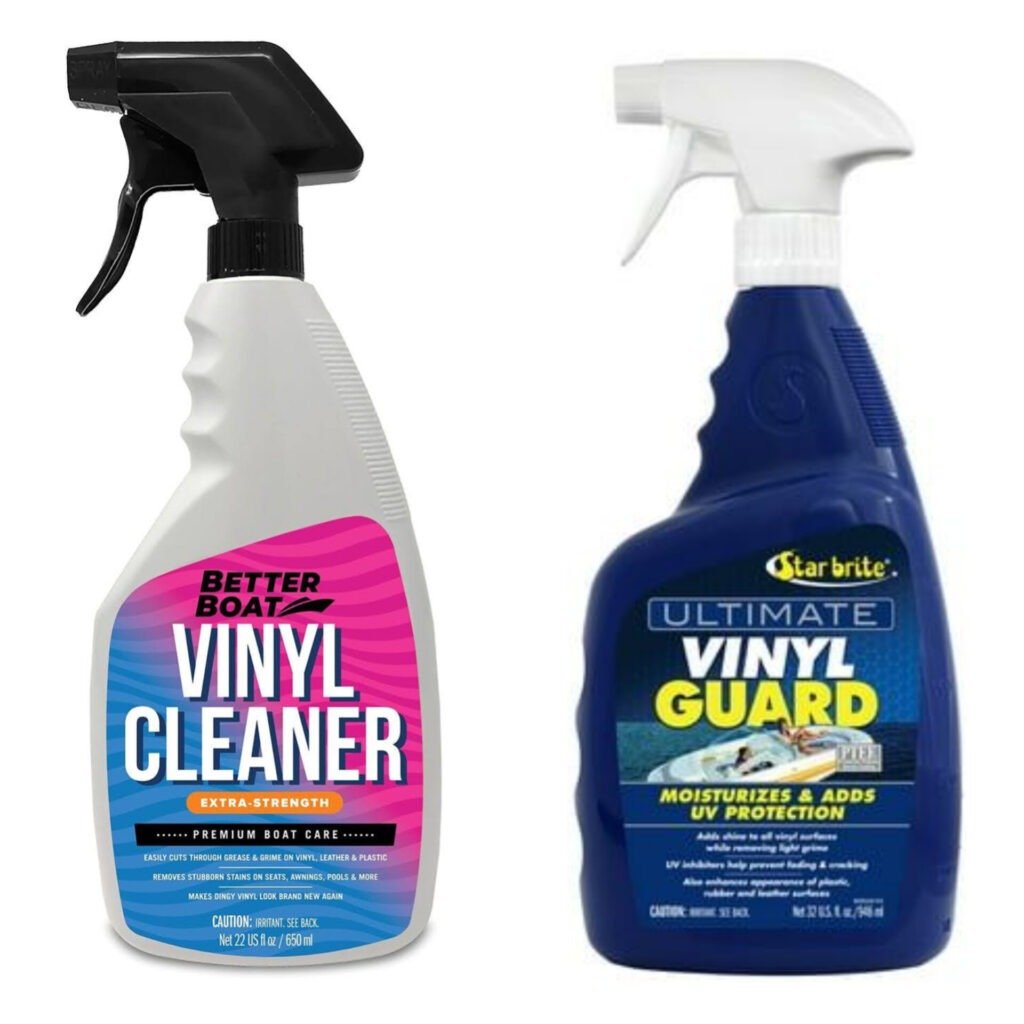
Magic Erasers for Scuff Marks
Magic erasers are a must have for quick scuff mark removal. Dampen the eraser and gently rub it over the marks. You Will be amazed at how easily they disappear. This method works wonders without needing to use any additional cleaning products.
Rinse with Fresh Water After Each Use
If you’re boating in saltwater, a quick rinse with fresh water after each outing can prevent salt buildup on your fenders. It’s a small step that makes deep cleaning much easier later on.
Apply a Vinyl Protectant
After cleaning, apply a vinyl protectant like 303 Marine Vinyl Protectant. It not only restores the shine but also adds a UV-protective layer. This helps maintain the fender’s color and prevents future stains from setting in.
Storage and Protection of White Boat Fenders
Once you’ve learned how to clean white boat fenders and keep them looking their best, it’s time to think about proper storage. Proper storage is crucial to maintaining their bright white color and ensuring they stay in great condition.
Storing Your Boat Fenders Properly
When your boat is docked or not in use, store the fenders in a dry, shaded area. Here’s why: direct sunlight can cause discoloration and weaken the fender’s material over time. UV rays are notorious for yellowing white surfaces, and fenders are no exception. If you’re storing your boat for an extended period, it’s best to remove the fenders entirely and keep them indoors or under a cover.
Hang them carefully
If you prefer to hang your fenders, make sure they’re not in contact with harsh surfaces. This prevents unnecessary scuffing.
Avoid stacking
Stacking fenders can cause them to become misshapen. Instead, hang them in a way that keeps their natural shape.
Use fender bags
Consider investing in fender storage bags. These bags provide an extra layer of protection against dust, dirt, and UV rays.

Using Fender Covers for Added Protection
Fender covers are a simple yet effective way to protect your fenders. They act like a shield, taking on the dirt and grime that would otherwise stain the fender’s surface. The great thing is, they’re easy to wash or replace as needed. Plus, they come in various colors, so you can choose a style that complements your boat.
Tip-Always ensure the fender cover is made of a non-abrasive material to prevent scratching.
By incorporating these storage and protection tips into your routine, you’ll keep your boat fenders looking new and ready for action whenever you need them.
Common Mistakes to Avoid When Cleaning Boat Fenders
Even with the best intentions, it’s easy to make mistakes when cleaning and maintaining boat fenders. Let’s go over some common pitfalls and how to avoid them.
Using Harsh Chemicals
One of the biggest mistakes is using harsh chemicals that can damage the vinyl surface of your boat fenders. Products like bleach, acetone, and industrial cleaners can strip the protective coating on the fenders, leaving them vulnerable to discoloration and wear. Instead, stick to mild, eco-friendly soaps and specialized boat fender cleaners designed for marine use.
Scrubbing Too Hard
It’s tempting to scrub aggressively when you encounter stubborn stains, but doing so can cause scratches on the fender’s surface. Use a soft brush or sponge and apply light pressure. If a stain is particularly tough, let the cleaner sit for a few minutes to break it down before gently scrubbing.
Neglecting Regular Maintenance
Waiting too long between cleanings allows dirt, salt, and grime to build up, making it much harder to clean later. Regular maintenance, like a quick rinse with fresh water after each use, goes a long way in preventing stains from setting in.
Skipping the Rinse
After using soap or a cleaning product, it’s important to rinse off any residue. Leftover soap can leave streaks and attract more dirt. Always finish with a thorough rinse using clean, fresh water to ensure all cleaning agents are removed.
Conclusion
Keeping your boat fenders clean and well-maintained is not as daunting as it might seem. By following the steps outlined in this guide, you’ll master how to clean white boat fenders effectively and keep them looking their best.
From gathering the right tools to using the best cleaning methods and storing them properly, a little care goes a long way in extending the life of your fenders. Avoid common mistakes, use mild cleaners, and always think ahead to prevent dirt buildup. Remember, the key to bright, white fenders is consistency and a bit of preventive maintenance.
Feel free to bookmark this guide or share it with your fellow boaters. Got your own cleaning tips or hacks? We’d love to hear them in the comments! By taking a few simple steps now, you’ll save yourself a lot of effort in the future and enjoy that “brand new” boat look every time you head out on the water!
Click Here To Check Products For Cleaning
FAQs
1. How often should I clean my white boat fenders?
It’s best to give your boat fenders a quick rinse with fresh water after every use, especially if you’re boating in saltwater. For a more thorough cleaning, aim to wash them at least once a month. Regular cleaning prevents stains and keeps your fenders looking their best.
2. What is the best cleaner for white boat fenders?
The best cleaner is a mild, eco-friendly soap or a specialized boat fender cleaner designed for marine vinyl. Avoid harsh chemicals like bleach or acetone, as they can damage the fender’s surface. For stubborn stains, you can also use a DIY natural cleaner made from white vinegar and baking soda.
3. Can I use a pressure washer to clean my boat fenders?
It’s not recommended. While a pressure washer might seem like an easy fix, the high pressure can damage the fender’s surface and cause scratches. Stick to a soft brush or sponge for scrubbing, and use a gentle flow of fresh water for rinsing.
4. How do I remove scuff marks from my boat fenders?
Magic erasers work wonders for removing scuff marks! Dampen the eraser and gently rub it over the marks. You can also use white vinegar on a cloth and rub in a circular motion. Both methods are effective and safe for your fenders.
5. Should I cover my fenders when storing them?
Yes! Using fender covers is a great way to protect your fenders from dirt, dust, and UV damage. When storing your boat, try to keep the fenders in a dry, shaded area to prevent discoloration and maintain their shape.
You Might Also Like

